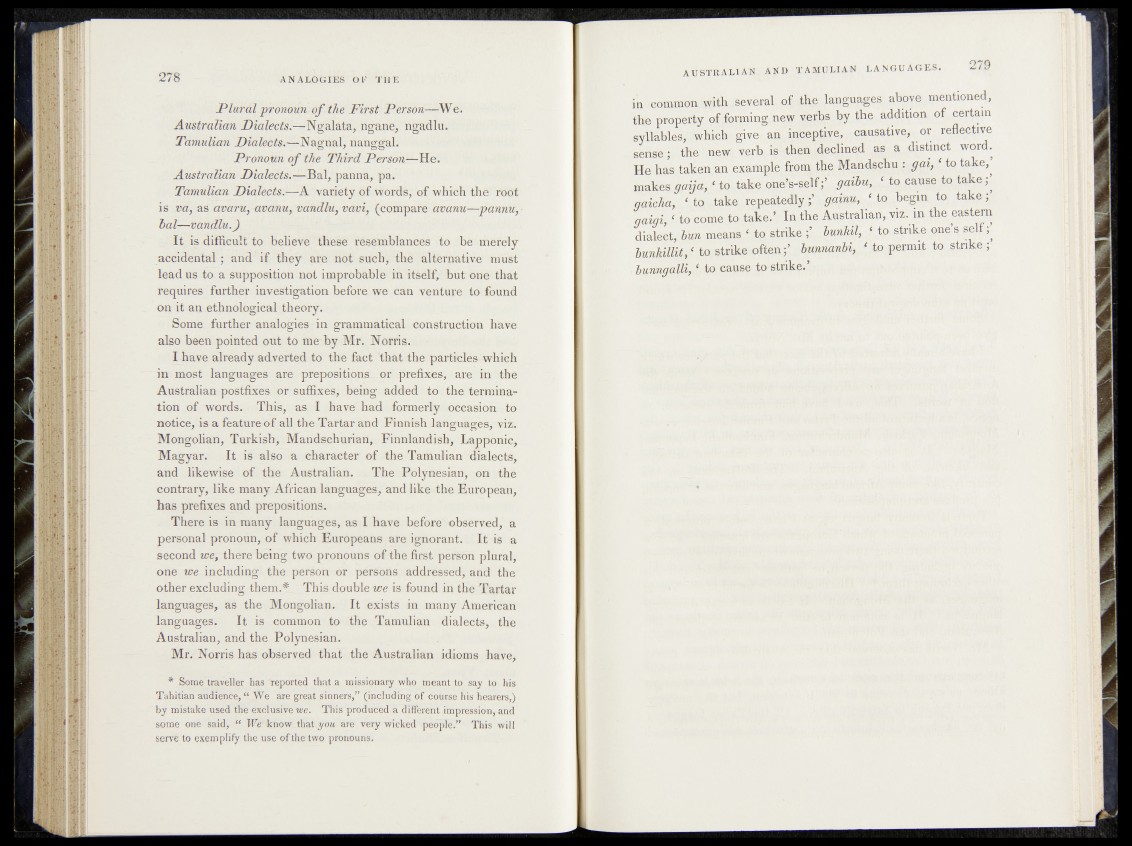
Plural pronoun o f the First Person—We.
Australian Dialects.—Ngalata, ngane, ngadlu.
Tamulian jDiaZec&.-^-r-Nagnal, nanggal.
Pronoun o f the Third Person—He.
Australian Dialects.—Bal, panna, pa.
Tamulian Dialects.—A variety of words, of which thé root
is va, as avaru, avanu, vandlu, vavi, (compare avanu—pannu,
bal—vandlu.)
It is difficult to Believe these resemblances to be merely
accidental; and if they are not such, the alternative must
lead us to a supposition not improbable m itself, but one that
requires further investigation before we can venture to found
on it an ethnological theory.
Some further analogies in grammatical construction have
also been pointed out to me by Mr. Norris.
Ihave already adverted to the fact ‘that the partieles-which
in most languages are prepositions^ or prefixes, are in the
Australian postfixes or suffixes, being added to the termination
of words. This, as I have had formerly occasion to
notice, is a feature of all the Tartar and Finnish languages, viz.
Mongolian, Turkish, Mandschurian, Finnlandish, Lapponic,
Magyar. It is also a character of the Tamulian dialects,
and likewise of the Australian, c The Polynesian, on the
contrary, like many African languages, and like the European,
has prefixes and prepositions.
There is in many languages, as I have beforexobserved, a
personal pronoun, of which Europeans are ignorant. It is a
second we, there being two pronouns of the first person plural,’
one we including the person or persons addressed; and the
other excluding them.* This double we is found in the Tartar
languages, as the Mongolian. It exists in many American
languages. It is common to the Tamulian dialects, the
Australian, and the Polynesian.
Mr. Norris has observed that the Australian idioms have,
* Some traveller has "reported that a missionary who meant to say to his
Tahitian audience, “ We are great sinners/’ (inglud ing of course his hearers,)
by mistake used the exclusive we. This produced a different impression, and
some one said, “ We know that.j/ow are very wicked people.” This will
serve to exemplify the use of the two pronouns.
in common .with, several of the languages above mentioned,
the property of forming new verbs by the addition of certain
syllables, which give an inceptive, -causative,.or reflective
sense; the new verb is then .declined ,ps a distinct word.
He has taken an example from the Mandschu : gai, | to take,
makes ggija, ‘ to take o n e s e l f S H O p i cause to take;’
aaicha, 1 to take repeatedly gpim, ‘ to begin, to take;
qaiqi, ‘ to come to take.’ In the Australian, viz. m the eastern
dialept, bun means ‘ r tp strike hwMl, , # rike- °PS’S-M ;
bunhiltiti) to strike often;’ bummhi, ( to permit to strike;
• bunngalli, ‘ to cause to strike.